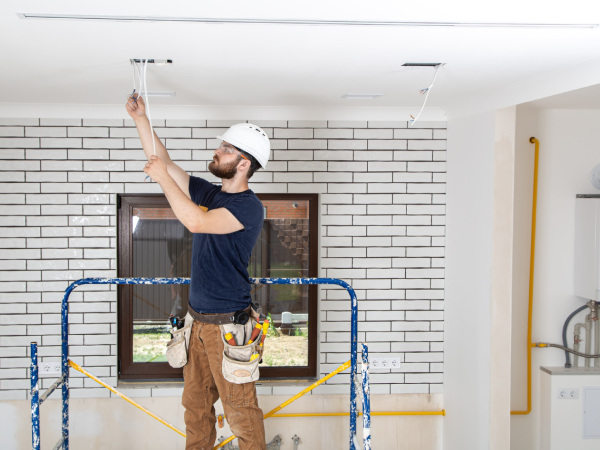
From fixer-upper to fabulous: how to renovate your older house
While an older home (built before 1990) has character, it may not boast the liveability factor you’re looking for. Restoring a fixer-upper can be a challenge, but it’s truly rewarding once you reveal its hidden potential.
This guide is perfect if you’re a homeowner wishing to give your home a new lease on life. From paint ideas to boosting curb appeal, there are so many ways to improve your space. Who knows? You may even create the perfect rental or flip property!
Share This Post
Get permissions in order
South Africa’s National Building Regulations (NBR) say that any building or structural changes need planning approval from your local municipal office. However, if your changes are small and do not impact external or structural walls, you are free to proceed.
Also, according to the National Heritage Resources Act 25 of 1999, you can’t alter or demolish any structure or part of a structure which is older than 60 years without a permit. And yes, that applies to your home even if it lacks any historical significance or aesthetic appeal. You will need to apply for a permit from your local provincial heritage resources authority or risk penalties and orders to stop renovating.
Start with a plan
Before you roll up your sleeves, it’s important to plan your old home renovation. Consider timelines, processes, costs, and help required to complete your project. Also, think about your needs. Are you a professional in need of a home office rather than extensive garage space? Or, are you a family in need of open-plan space? Any changes made should add value to your lives.
Evaluate your property
While it can be tempting to completely modernise your home, it would be a shame to remove everything that makes it special. Some touches from previous eras can make your property stand out, so consider what would be good to save. You should also scrutinise your home for any serious defects in need of fixing:
- Leaks from walls, the roof, or plumbing lines
- Cracks in your foundation
- Faulty electrical wiring
- Mould and mildew
- Insect infestations
Work on your budget
Your evaluation will help you understand what you need to get done. From there, planning a budget will be easier. Create a spreadsheet including material costs and labour estimates. Old houses can come with surprises, so do budget for any unforeseen expenses.
Call in the renovation pros
Renovating your home needs a delicate touch. It’s safer to assemble an experienced team who has worked on older properties. This can include home inspectors, architects, builders, professional cleaners, painters, designers, decorators, and landscapers. Whomever you choose to hire, ensure you check their certifications and reviews online.

Create a cohesive decor scheme
A wonderful way to modernise an outdated home is with a consistent, flowing decor scheme. Older homes often have colours and architectural quirks reflecting different decades, especially if ownership changed hands several times. Once all major fixes are done, you can work on using colour consistently throughout your home and making modern changes to the infrastructure.
Paint your home pretty
This is a modernising marvel! Painting walls can cover up cracks and stains while also banishing outdated colours. But, a fresh splash of paint can also revamp countertops, cupboards, tiles, trims, doors, and even that marble fireplace. Neutral colours such as white, beige, and grey are timeless. However, you can draw inspiration from the year’s trending colours for a look everyone will love.
Make old flooring bold flooring
This impactful change can rejuvenate your home. You should rip out old carpeting, linoleum, or vinyl that is ageing your space. Replace them with modern tiles or hardwood flooring for a sleek look.
If you’re lucky, you could have hardwood floors buried underneath bad carpeting that may simply need sanding, restaining, and revarnishing. If tiles are in good condition, paint can be used to tie them in with your modern scheme.
Say goodbye to old fixtures
Revamping fixtures can be a quick fix to make your home feel more youthful. Go after those that are stained, rusted, chipped, or don’t work with your new decor scheme. It can be as small as replacing light switches and sockets, changing light fixtures, to bigger moves like overhauling cupboards. Paint, wallpaper, or a complete redesign of kitchen cupboards, for example, can make the heart of your home feel brand new.

Rethink your window treatments
While heavy curtains and blinds were in fashion back in the day, tastes have evolved. Opt for curtains in solid colours, geometric shapes, or ombre patterns. Neutral colours and sheer materials can make your space feel light and fresh. Roller blinds, eco-friendly blinds made from sustainable materials, and smart blinds that work with a motor are on trend and worth the spend.
Make an impression with curb appeal
Prioritising curb appeal (how good your home looks on the outside) influences its value. An older home may fall short with missing/faded roof tiles, a cracked driveway, ravaged gutters, and an unruly landscape. Working on this can give your home a facelift. You can take it a step further by improving on your home’s exterior security features or installing solar panels.
Don’t forget to have fun renovating
Updating an older home can take effort. But, it’s also an exciting opportunity to shape a place to meet your unique needs and vision. By following our advice, you’re sure to overcome some of the more common hurdles and create a modern space you’ll appreciate for years to come.







